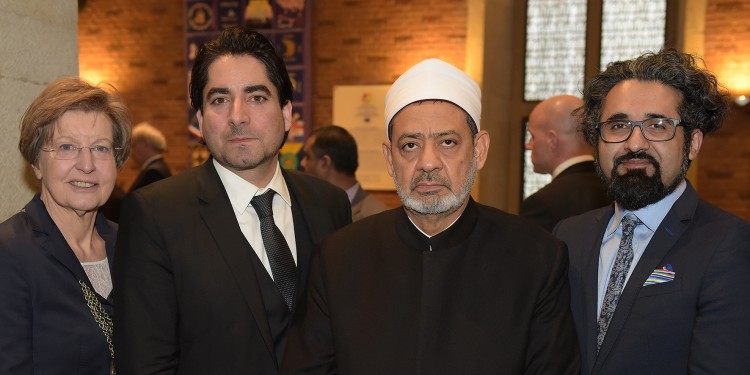
An appeal to the world for peace
High-ranking representatives of Christianity and Islam used a conference on religion at the University of Münster to issue a strongly worded appeal for peace, directed at countries and religious communities all over the world. “We must all take a stand against terrorism as the worst excess of political crises. All Muslims are called upon to embrace peace,” said the Grand Imam of Cairo’s Al-Azhar University, Sheikh Ahmed Mohammad al-Tayyeb. “Dialogue between faiths is a holy duty,“ said the Suffragan Bishop of Hamburg, Dr. Hans-Jochen Jaschke. At the same time, he said, the aim must never be to iron out differences; rather, diversity must be seen as an enrichment. “There can be no peace without thoroughgoing justice,” added the Swiss pastor and former President of the Community of Protestant Churches in Europe, Thomas Wipf. Unanimity also existed in another point: faith must never be used – or abused – for violent or terrorist ends.
The Grand Imam’s visit to Germany is the result of an initiative by the University of Münster. During a visit to Cairo by the Director of the Centre for Islamic Theology, Prof. Mouhanad Khorchide, Sheikh Ahmed Mohammad al-Tayyeb had – against a background of numerous acts of violence committed in the name of Islam – announced his intention of proclaiming a message of global peace. At the same time, and in addition to political talks in Berlin, he expressed the wish to visit Münster, the city of the Peace of Westphalia and the site of the largest Islamic Centre at any university in Germany. The Mayor of Münster, Markus Lewe, and the Rector of Münster University, Prof. Ursula Nelles, then extended an invitation to him. In his welcoming speech vice-rector Prof. Stephan Ludwig pointed out the importance of the WWU as a place of interreligious exchange which has been cultivated intensively for decades - he referred to the faculties of catholic and protestant theologies, the Centre of Islamic Theology and the Centre of Excellence called “Religion and politics” as a perfect basis for this exchange.
The Sheikh, one of the highest authorities of Sunni Islam, used the conference on religion to point out the peaceful nature of his religion. “Islam and Salam [peace] are two sides of the same coin,” he said, pointing out that the word “peace” occurs 140 times in the Qur’an, while “war” is found only six times. He emphatically warned against “barbarism and chaos”. However, Islam and religions in general which are abused for political ends must not be held responsible “for the hell of war”, he added. The Sheikh then mentioned the “exemplary work” being done at the Centre for Islamic Theology, which enjoyed worldwide recognition.
Hans-Jochen Jaschke, who took part in the exchange of views in his capacity as President of the Subcommittee for Inter-Faith Dialogue initiated by the German Bishops’ Conference, said the Sheikh’s visit was a “powerful signal”. In his speech, the Suffragan Bishop of Hamburg particularly underlined the freedom inherent in religions. This freedom, he said, held true for every single person, including those of no faith. “Freedom of religion is a human right and corresponds in this sense to the will of the Creator.”
Thomas Wipf, who called both the City and the University of Münster “one of the capitals of Europe for inter-faith dialogue”, described the exploitation of religions for violent purposes as the “great evil of the present day”. At the same time he reminded listeners that in many crisis areas around the world there were many examples of tolerance and solidarity being practised. “We focus much too much on negative things, on extremes. We should pay a great deal more attention to places where people get along together very much as a matter of course, in spite of all the differences they have.” No one must insist on knowing religious truths. “This attitude is often – and demonstrably – harmful for communities.“
On Wednesday the Grand Imam and the German Bishops‘ Conference spoke of the common responsibility that religions had for peace. In a joint declaration they underlined that Christians and Muslims had a duty to speak out publicly and resolutely against violence in any form.
The Al-Azhar University in Egypt’s capital, Cairo, is one of the oldest educational establishments in the Islamic world, and is one of its most influential guides. It was founded in the 9th century as a central mosque, with teaching capacities adjoined. Later the mosque became a Sunni teaching establishment. Over the years, the Al-Azhar Mosque expanded its competences to the extent that, since the 19th century at the latest, it has been considered to be a religious institution with a university structure.
Sheikh Ahmad Mohammad al-Tayyeb was born in Luxor, in Egypt, in 1946 and has been active as a theologian and philosopher in Islamabad, in Pakistan, and at the Sorbonne in Paris. Since 2010 he has been Grand Imam of the Al-Azhar University. In his capacity as President of the Muslim Council of Wise Men he has repeatedly advocated inter-faith dialogue.
